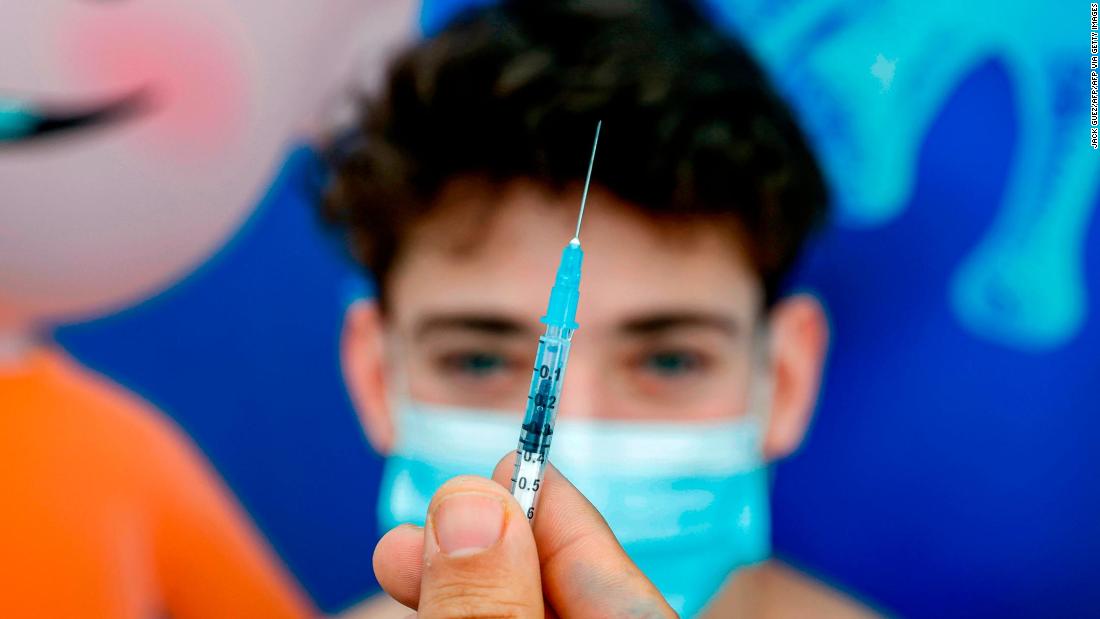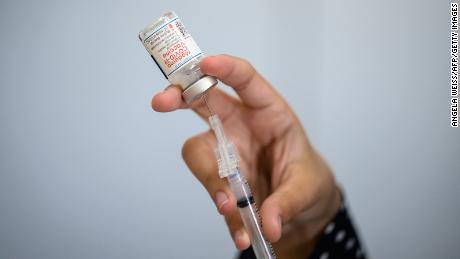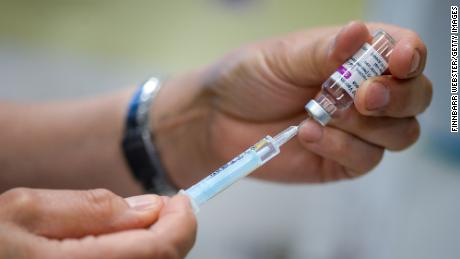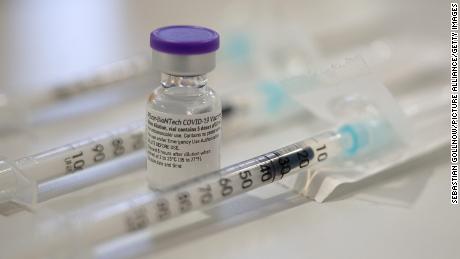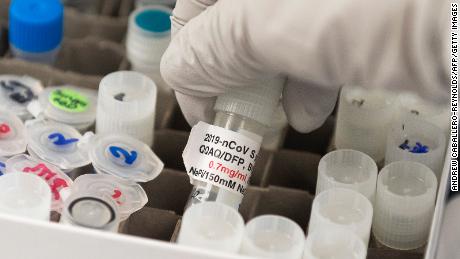Covid vaccine boosters may be necessary. What you need to know
Currently three coronavirus vaccines are authorized for emergency use in the United States — the two-dose Pfizer/BioNTech vaccine for ages 12 and older, the two-dose Moderna vaccine for ages 18 and older and the single-dose Johnson & Johnson vaccines for ages 18 and older.
Researchers and health officials suspect that the immunity against Covid-19 these vaccines elicit in the body might wane over long periods of time — say, possibly, after a year or more — and might not protect as well against coronavirus variants that could emerge and evolve.
Therefore, a vaccinated person might need a booster dose of vaccine to stay protected against the original coronavirus strain and newly emerging variants — somewhat similar to how a tetanus booster is recommended every 10 years or different flu vaccines are recommended each year.
Will booster doses or new vaccines be needed?
In the case of Covid-19 vaccines it remains unknown for how long immune protection lasts, but vaccine developers and health officials know it may not be forever — and that emerging variants could escape immunity.
“There is a little nuance with Covid-19 vaccines,” Moss said.
While typical booster doses use same vaccine someone previously received to remind the immune system about immunity to a pathogen, any future boosters for the Covid-19 shot could use different vaccines altogether.
But Americans should prepare to have a Covid-19 vaccine booster shot within a year, US Surgeon General Dr. Vivek Murthy told CNN’s Wolf Blitzer on Thursday.
“We have to see how long the protection lasts. We know it lasts at least six months, but we’ll have to see,” Murthy said. “It’s very possible, though, and people should be prepared for the fact that we may need a booster within a year.”
How often will you need a Covid-19 booster?
Despite such predictions, Dr. Anthony Fauci, director of the National Institute of Allergy and Infectious Diseases, told CNN the bottom line is “we don’t know.”
“We’re preparing for the eventuality that we might need boosters, but I think we’ve got to be careful not to let the people know that inevitably, x number of months from now, everyone’s going to need a booster. That’s just not the case,” Fauci, chief medical adviser to President Joe Biden, said at a Washington Post Live event. “We may not need it for quite a while.”
Scientists at a number of companies that make Covid-19 vaccines have also predicted the need for boosters within a year — but the scientific community is not in widespread agreement on this.
“We’re making extrapolations” from incomplete data, Fauci told The Washington Post on Thursday.
So far, studies have shown that mRNA vaccines — those made by Pfizer and Moderna — maintain more than 90% efficacy six months after getting vaccinated. And scientists say it’s likely much longer.
Other studies have looked at antibodies in the lab. While a decline is expected over time, Fauci told the Post “the steepness of that slope is unclear right now.”
Experts say it is also unclear how these antibody levels correlate with real-world immunity, and to what extent other parts of the immune system — such as T cells — could factor into protection.
What happens if you skip the booster?
Whether booster coronavirus vaccine doses are modified or not, missing a booster dose — if one is recommended in the future — could leave someone less protected against Covid-19.
“A person who skipped a booster is placing themselves at higher risk of getting infected, and getting disease from the SARS-Coronavirus-2, but I would also expect that they’re going to have some partial immunity and so they may be protected against more severe disease,” Moss said. SARS-CoV-2 is the virus that causes Covid-19.
“It’s just a function of how much their immunity has waned or how different a variant is,” he said. “They’re just at higher risk of infection and disease than someone who got the booster, but they have more immunity than someone who was never vaccinated.”
Scientists are also currently investigating whether it makes a difference if someone gets the same type of vaccine as a booster as the original dose administered.
“This question of mixing and matching certainly is relevant to booster doses,” Moss said. “It’s also relevant to any two-dose vaccine schedule, and it’s also an area of active research.”
Researchers in the United Kingdom reported last week that people who got mixed doses of coronavirus vaccines — receiving a different vaccine type as a second dose than the first dose — appear to be more likely to experience mild side effects such as fever, chills, fatigue or headache.
As for booster doses in the future, “I can very much envision a situation in which people might get a very different type of vaccine for that booster dose than they had originally,” Moss said. “The big question I have, I guess, is how much underlying scientific evidence are we going to have to support that to actually make it a recommendation? That I don’t know yet, but it’s certainly likely to happen by default, just because perhaps the original vaccine is not available.”
Who is making booster shots?
All three companies that currently have authorized coronavirus vaccines in the United States — Pfizer, Moderna and Johnson & Johnson — are investigating the potential use of boosters.
“We are right now in the middle of these trials and the data are coming as we speak,” Pfizer CEO Albert Bourla told Axios during a virtual event on Wednesday.
“The data that I see coming, they are supporting the notion that likely there will be a need for a booster somewhere between eight and 12 months,” Bourla said. ” But that remains to be seen and I believe in one, two months we will have enough data to speak about it with much higher scientific certainty.”
The first dose of Pfizer’s coronavirus vaccine in the United States was administered on December 14, 2020 — five months ago. As time goes on, if people received their second dose of vaccine eight months ago, “they may need a third one,” Bourla said. “This could be coming sooner than later, I believe from September, October. But this is something, again, that the data need to confirm.”
Moderna is currently conducting booster shot trials too.
The fight against the coronavirus pandemic is expected to continue through next year due to the emergence of variants, Dr. Stephen Hoge, president of Moderna, said during an earnings call earlier this month.
“We think this is just the beginning,” Hoge said. “Therefore, we’re committed as a company to make as many updates to the vaccine, to add as many variants as we think are necessary, to ensure that when people receive a booster, it provides the broadest immune protection against the widest range of variants.”
Johnson & Johnson is also looking into the potential for boosters.
“We have ongoing and planned trials that will aid our assessment of the need for, and timing of, booster doses of our vaccine,” according to an emailed statement Johnson & Johnson sent to CNN on Thursday.
Johnson & Johnson’s coronavirus vaccine, along with Pfizer’s, Moderna’s, and four others, are being tested as seasonal boosters in a study called Cov-Boost being conducted by the UK’s National Institute for Health Research and the University of Southhampton.
“In the US, I think it will be the booster for everyone, particularly if we get it out late in the third quarter,” Erck told CNN last week. “It’s going to be time to start boosting — whether it’s six months or at a year point.”
Who has to OK the Covid-19 booster shots?
The decision to use Covid-19 boosters is expected to involve two agencies — the US Food and Drug Administration and the CDC — and the regulatory process to get the shots into arms could vary depending on whether the booster is the same vaccine that was originally used or is a modified version.
“So, if it’s the same vaccine, my understanding is that what would have to happen is that the CDC would have to recommend an additional dose with details around when that should occur,” Moss said.
If it’s a modified vaccine, “this is where things get interesting and I don’t think we quite know,” he said, but added that the regulatory process could be similar to what happens with flu vaccines each year.
“Technically, whenever a vaccine like that is modified, it’s often considered a new vaccine and has to go through the whole process again. But there is a precedent, obviously, with influenza virus vaccines, not to do that,” Moss said. “So, the influenza vaccine each year doesn’t have to go through a large Phase 3 trial.”
That’s because the vaccine technology stays the same, and the only change is the flu virus itself that the vaccine targets to elicit immunity to a specific flu virus strain that’s circulating.
Moss said that’s what he expects could happen with modified coronavirus vaccines.
“At this time, available information suggests that the FDA-authorized vaccines remain effective in protecting the American public against currently circulating strains of SARS-CoV-2. However, if there is an emergence of SARS-CoV-2 variant(s) in the U.S. that are moderately or fully resistant to the antibody response elicited by the current generation of COVID-19 vaccines, it may be necessary to tailor the vaccines to the variant(s),” an FDA spokesperson told CNN on Thursday.
“Further discussions will be necessary to decide whether in the future, modified COVID-19 vaccines may be authorized without the need for clinical studies,” according to the guidance. But overall, vaccine developers are “encouraged” to perform exploratory studies on modified vaccines to boost immune responses.
CNN’s Virginia Langmaid, Michael Nedelman and Jen Christensen contributed to this report.
![]()


